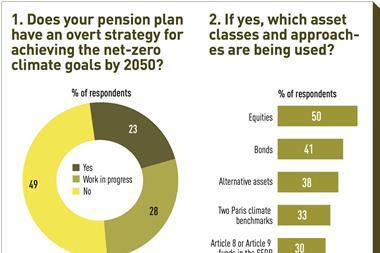Climate Action 100+ has responded to the recent withdrawal from the initiative by some US asset managers, saying in a letter to signatories that it wanted to “address several important points in light of some recent departures and the reporting of these”.
Earlier this month it came to light that JP Morgan Asset Management, PIMCO and State Street Global Advisors (SSGA) were leaving the collaborative engagement initiative, with BlackRock transferring its participation to its international arm.
In a statement today CA100+ said it could confirm these developments and that while the withdrawals were disappointing, “hundreds of investor signatories remain committed to ensuring 170 of the largest greenhouse gas emitters reduce emissions, improve governance, and strengthen climate-related financial disclosures”.
In a separate letter to signatories, the steering committee started by saying that it wanted to thank them for their participation in the initiative, which “has been instrumental in changing the conversation about the role and value of corporate involvement in addressing climate change and has raised the bar for corporate climate ambition and action globally”.
‘Always action-orientated’
Across both the letter and statement, CA100+ then went on to discuss achieved progress before stating that “the fundamental principle that underpins Climate Action 100+ is that climate risk is financial risk”.
Participating investors agreed to act independently in deciding whether and how to engage with focus companies, it added, and the initiative’s terms of participating “do not set any formal, legal or contractual requirements or obligations upon an investor’s engagement activity”.
CA100+ also said it had been consistent in its purpose since its inception.
“The initiative has always been action-orientated and about more than disclosure,” it stated.
The points made by CA100+ can be seen as a response to – an attempt to rebut – the varying accounts given by the US managers of their reasons for leaving the initiative.
A spokesperson for SSGA, for example, said that “enhanced Climate Action 100+ Phase 2 requirements for signatories will not be consistent with our independent approach to proxy voting and portfolio company engagement”.
BlackRock, meanwhile, said in a press statement that: “The new Phase 2 approach of CA100+ will require signatories to make an overarching commitment to use client assets to pursue emissions reductions in investee companies through stewardship engagement.
“In our judgment, making this new commitment across our assets under management would raise legal considerations, particularly in the US.”
Phase 2 is a reference to CA100+’s strategy for the next seven years, launched in June 2023. Announcing the new strategy at the time, CA100+ said it involved an “enhanced investor engagement model” and was “markedly shifting the focus from corporate climate-related disclosure to the implementation of climate transition plans”.
Elaborating on its statement today that the initiative had always been about more than disclosure, CA100+ said that, “[f]or instance, the second of the three core asks of companies is centered upon asking companies to ‘take action to reduce GHG emissions across the value chain’”.
It also said that the updated request for companies to implement transition plans in phase two “is logical and natural builds on what came before”.
“Specifically, in phase one, investors asked companies for enhanced disclosures to enable them to assess the robustness of companies’ business plans against a range of climate scenarios. This was intended to improve investment decision making. Having disclosed the risks, it is natural progression that in phase two investors ask companies to address them, i.e. to implement transition plans.”
The exits of the US asset managers come amid intense politicisation of the consideration of ESG matters in investment in parts of the US, as is exemplified by BlackRock’s decision to only withdraw the assets it managed on behalf of US investors.
Last year, when it launched its new strategy, CA100+ sought to address accusations about anti-competitive behaviour from ‘anti-ESG’ corners in the US by adding a 400-word legal disclaimer about the freedom of signatories to behave independently.
Looking for IPE’s latest magazine? Read the digital edition here























